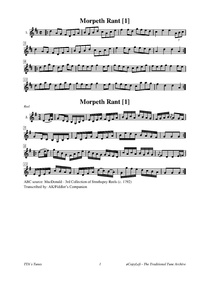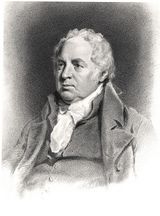Template:Pagina principale/Vetrina: Difference between revisions
No edit summary |
No edit summary |
||
| Line 20: | Line 20: | ||
It was one of the "missing tunes" from William Vickers' 1770 Northumbrian manuscript. | It was one of the "missing tunes" from William Vickers' 1770 Northumbrian manuscript. | ||
The older form of the tune can be found in the music manuscript collections of C.J. Surtees (Tyneside, 1819), Joshua Jackson (north Yorkshire, 1798), Rev. Robert Harrison (Brampton, Cumbria, c. 1815, as " | The older form of the tune can be found in the music manuscript collections of C.J. Surtees (Tyneside, 1819), Joshua Jackson (north Yorkshire, 1798), Rev. Robert Harrison (Brampton, Cumbria, c. 1815, as "Princess of Wales' Hornpipe"), John Moore (Shropshire, 1830, as "New Sailor's Hornpipe") and in a manuscript by an unknown hand in the Vaughn Williams Memorial Library (as "[[West's Hornpipe]]" with an added eight bars). | ||
The tune and several variation sets was published by the Edinburgh music publishing firm of Nathaniel Gow and William Shepherd in a volume entitled '''A Collection of Entirely Original Strathspey Reels, Marches, Quick Steps &c.''', "by Ladies resident in a remote part of the Highlands of Scotland, as corrected by Nath. Gow." | The tune and several variation sets was published by the Edinburgh music publishing firm of Nathaniel Gow and William Shepherd in a volume entitled '''A Collection of Entirely Original Strathspey Reels, Marches, Quick Steps &c.''', "by Ladies resident in a remote part of the Highlands of Scotland, as corrected by Nath. Gow." | ||
Revision as of 09:53, 1 September 2023

Played by: Edric Ellis
Source: Soundcloud
Image: William Shield (1748–1829).

The composition is often attributed to William Shield (1748–1829), a popular 18th century musician and composer originally from Swalwell, near Gateshead, Northumberland. However, as Barry Callaghan (2007) and others have pointed out, Shield often appropriated traditional or folk melodies, and "Morpeth Rant" may not be original to him.
The town of Morpeth [1] is in Northumberland, a market center on the River Wansbeck serving the surrounding rural areas and the villages of the Northumbrian coalfield (Graham Dixon). It evolved around a Norman fortress called Morpeth Castle, one of several guarding the east coast routes to Scotland.
It was one of the "missing tunes" from William Vickers' 1770 Northumbrian manuscript.
The older form of the tune can be found in the music manuscript collections of C.J. Surtees (Tyneside, 1819), Joshua Jackson (north Yorkshire, 1798), Rev. Robert Harrison (Brampton, Cumbria, c. 1815, as "Princess of Wales' Hornpipe"), John Moore (Shropshire, 1830, as "New Sailor's Hornpipe") and in a manuscript by an unknown hand in the Vaughn Williams Memorial Library (as "West's Hornpipe" with an added eight bars).
The tune and several variation sets was published by the Edinburgh music publishing firm of Nathaniel Gow and William Shepherd in a volume entitled A Collection of Entirely Original Strathspey Reels, Marches, Quick Steps &c., "by Ladies resident in a remote part of the Highlands of Scotland, as corrected by Nath. Gow."
Unfortunately, the composers names are not given. The Leeds antiquarian Frank Kidson (1854–1926) penciled a note in his copy of the volume that the composers were, or included, “the Misses Whyte,” and modern researcher Charles Gore thinks “the Misses Whyte” may possibly be a Miss White and a Miss Brocky, of Morayshire, east Highlands.
...more at: Morpeth Rant - full Score(s) and Annotations
X:5 T:Morpeth Rant [1] S:Petrie's Second Collection of Strathspey Reels and Country Dances &c. Z:Steve Wyrick <sjwyrick'at'astound'dot'net>, 6/11/04 N:Petrie's Second Collection, page 17 L:1/8 M:C R:Reel K:G V:1 clef=treble name="5." [V:1](D/E/F)|G2DC B,G,B,D|ECEG FDFA|BGcA dBAG|FGAB A2 GF| G2DC B,G,B,D|ECEG FDFA|Bedc BAGF|[B,2D2G2][B,2D2G2][B,2D2G2]::ef| gdBG FAce|dBAG {G}F2 (ED)|cAcA BGBG|FGAF D2 (D=F)| ECEG cBAG|FDFA dcBA|Bgfe dcBA|[B,2D2G2][B,2D2G2][B,2D2G2]:|]
